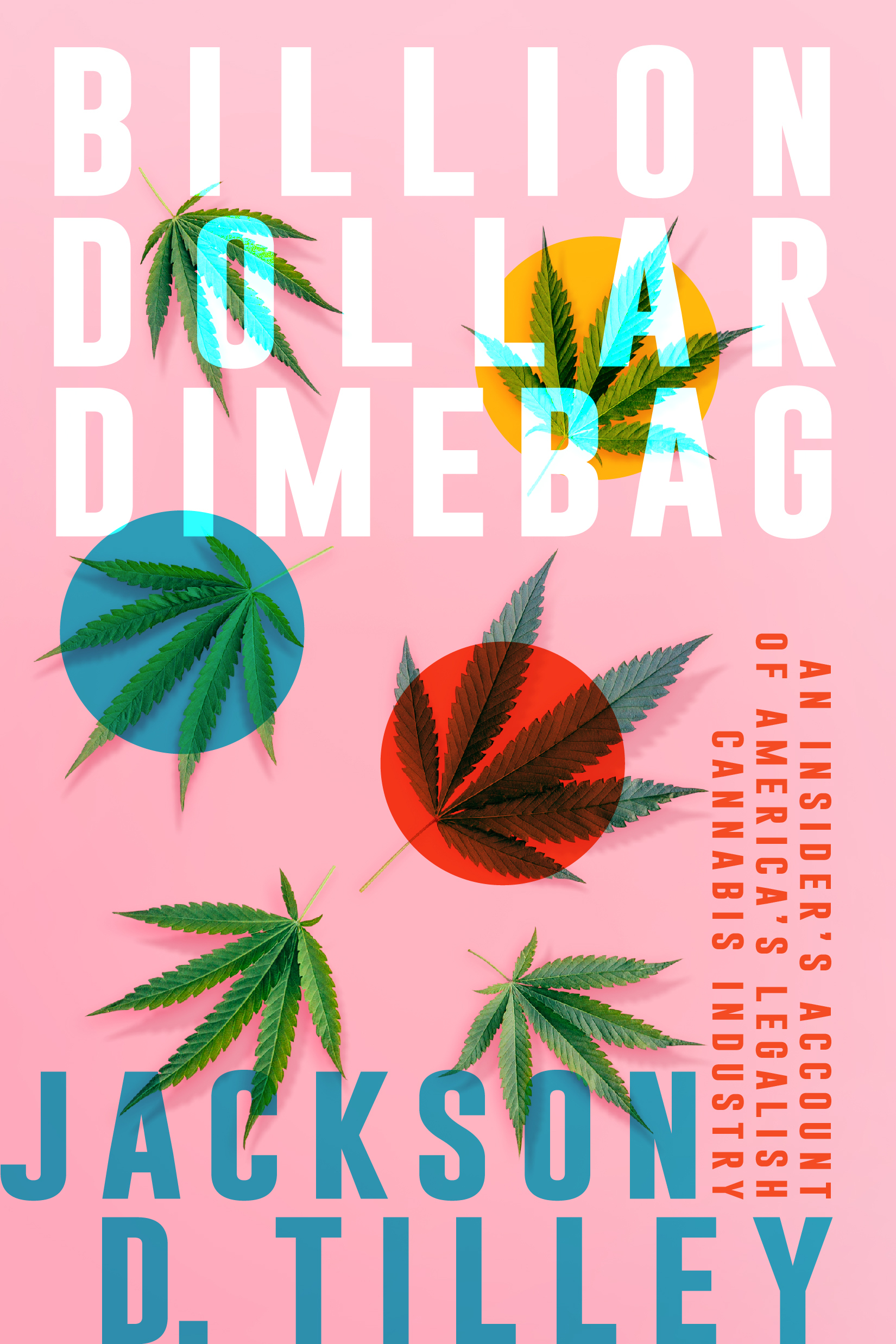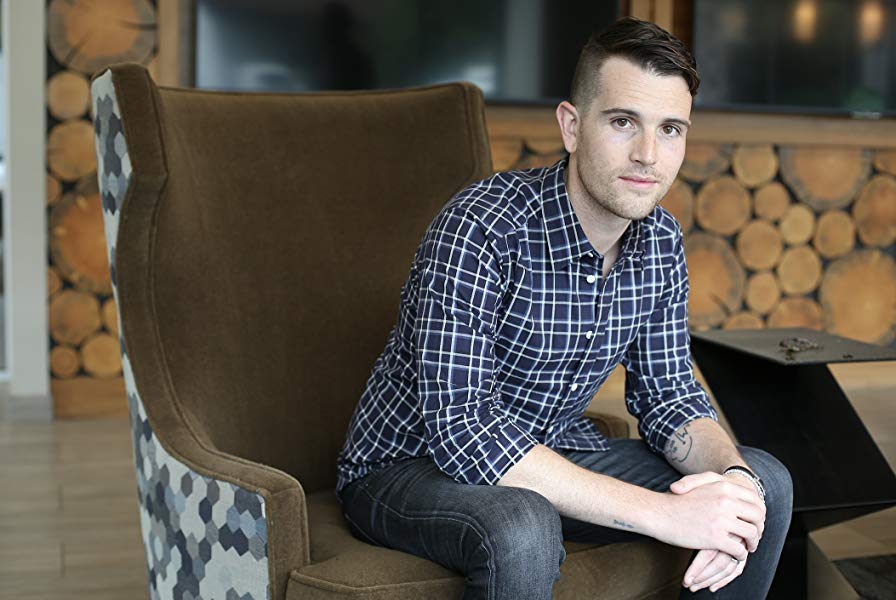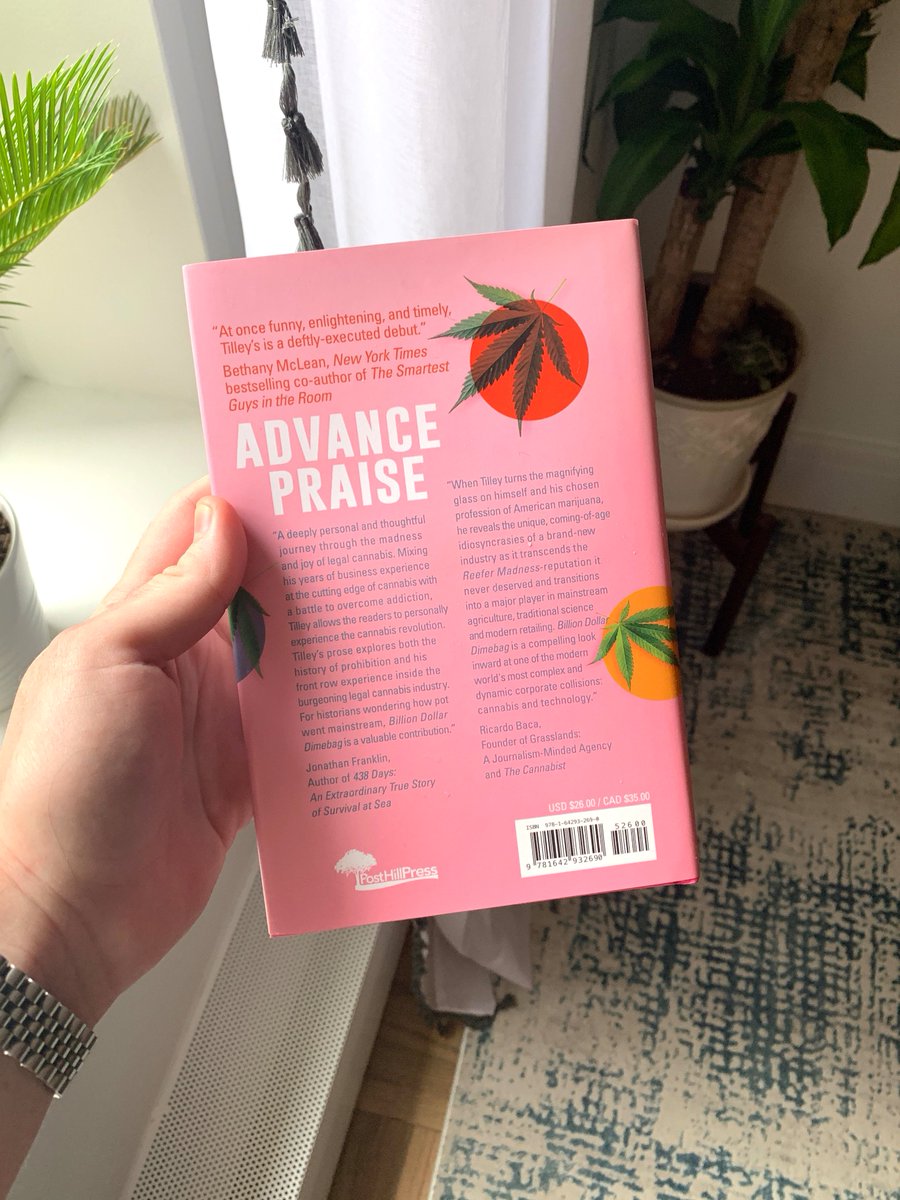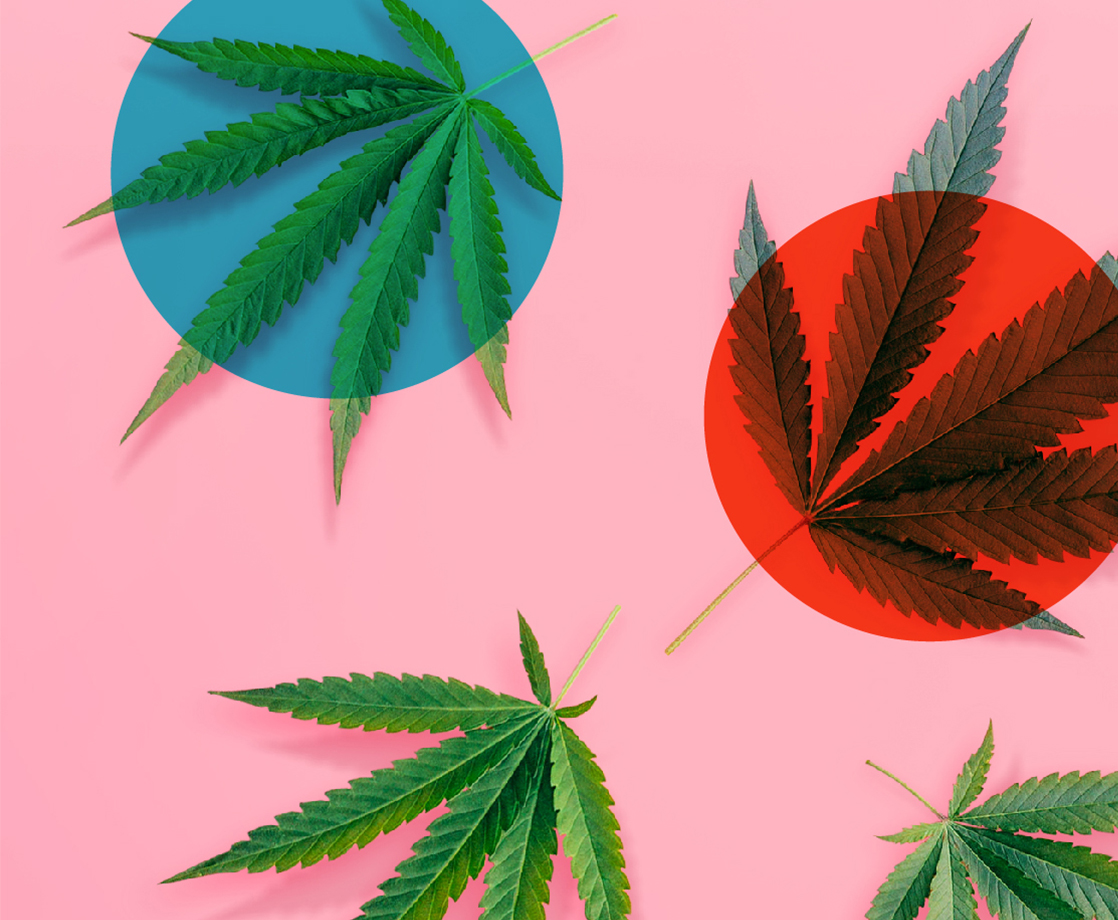Lead photo of Jackson D. Tilley by Karly Goranson
In the past few years, bookstores have been flooded with tomes covering marijuana legalization’s broad sweep across political, social, judicial, media, and financial landscapes. Almost every single one of these books has been penned by journalists, historians, or weed industry executives.
So, it was high-time that someone who started at the bottom of this fledgling industry is now here to share his story with a world thirsty for more info on legal weed. His name is Jackson Tilley, and he’d like you to know that even though he doesn’t consume cannabis these days, he believes every responsible adult has the right to safely and legally access it.
“My story is not unique,” Tilley writes in the introduction of his memoir-meets-market-analysis, Billion Dollar Dimebag: An Insider’s Account of America’s Legalish Industry. “My goal is not insurrection. I simply want to change the hearts and minds of those who question personal freedom when it comes to the use of cannabis. I look forward to the day when I don’t have to argue with strangers about the glory of a regulated cannabis market.”
Of course, Tilley hadn’t always abstained from weed. As a younger man born and raised in Colorado, the first state to launch legal adult-use marijuana sales, he could always score some herb. And even though, like most Americans, he was subjected to public education’s anti-drug DARE programs — the kinds that force kids to sign useless waivers swearing off all drugs — he began puffing the green as soon as he left home and entered college.
While a student at the University of Colorado-Boulder just as the Centennial State went legal, he locked down an internship at one of the state’s biggest weed vape pen companies, o.Pen Vape. From there, the book chronicles his journey from an intro-level sales rep to becoming the Director of Communications at Organa Brands, o.Pen Vape’s parent company and the nation’s largest distributor of state-legal weed.
In a nutshell, Tilley’s story is the classic American tale of working up the ladder from the ground level to the crowning top. He’s now one of the point people who mediates the national discussion on weed and legalization among the nascent industry, the mainstream media, and a public that’s been simultaneously fascinated and overwhelmed by the sudden deluge of cannabis-centered news.
To find out more about Tilley’s story, as well as his insights into weed’s legalization and normalization, MERRY JANE gave him a ring in New York City, where he currently resides.

MERRY JANE: There are already dozens upon dozens of books on cannabis and cannabis legalization right now. What inspired you to write this book?
Jackson Tilley: Working in this industry, I’ve always been more interested in first-person narratives. I hadn’t really seen a book written by people like me or speaking for people like me, so I decided to write one myself.
I’ve read a lot of what we could consider the standard blue-chip book that’s been written about the industry. As I’ve worked in the cannabis space for the past five years, one of the pieces I felt was missing was more unique and diverse voices. Being someone in the LGBTQ+ community, and as someone who’s sober, I felt like I could unique a perspective that had not been shared. That was really the main driver.
I don’t know many sober people who work in cannabis, but I know there are some. I thought that alone would offer an interesting framework to write a book. That was the first step, then, fortunately, I got connected with some great people who helped me turn it into a reality.
Have you faced any stigma being a sober person working in the industry? Has it ever gotten in your way, or have most industry insiders and advocates been fine with it?
For sure. I think there’s always a little bit of a narrative around, “How can you support products that you don’t actively use?” I tend to find a lot of that to be a little bit baseless, and I personally haven’t faced any stigma first-hand. But I’ve also gotten out in front of that in a lot of ways, just by being a strong advocate for personal freedom. That’s really the point I try to make in the book: Even if you don’t use cannabis on a regular basis, or at all, I think a lot of people can still find a way to get behind this notion that there are these immense medical benefits to it. Also, [cannabis being] an alternative to alcohol is another argument.
There’s less stigma around being sober, I think, because more people are getting on board with the idea that you don’t have to use [cannabis] to support it.
You started off in Colorado, but you now live in New York City. New York’s been slow to implement legalization, and the legislature there recently decided to officially decriminalize weed instead of regulating its sales. Being at ground-zero in New York, what differences are you seeing with legalization there compared to how it rolled-out in Colorado?
It’s interesting, and I think while a lot of people were really disappointed with the outcome during the last legislative session, obviously decriminalizing it is a step in the right direction. For all of its faults, I have to lean into this idea that I think it’s somewhat admirable that the legislature is trying to be as responsible and conscious as possible when making these decisions, because it has a wide-reaching impact. Colorado was kind of the great experiment in all of this, and it worked out to our benefit and the benefit of a lot of other states — looking to Colorado as a model for legalization. In New York, I think there are additional legislative complexities due to the scale and size [of the state’s population], but I’m confident that it’ll be worked out by the next session.

At one point in the book you, you detail taking a break from the industry before getting in again. And after you returned, you got a sweet promotion to VIP Relations at Organa Brands. How did things change for you when that happened? I’m assuming this new position required you to rub shoulders and network with big names and celebrities.
It was definitely a turning point. Often, when you’re working with people of a certain caliber, it’s always Ask, Ask, Ask. People are always coming to them wanting things. Organa came to them at a good time. We weren’t asking for anything in return, we were just interested in having our products in the hands of case-makers who could really move the cultural needle. We were just offering this stuff up without asking for anything in return. And I did meet a lot of celebrities at that time, but none who I should name here [laughs].
Where do you see things going now in terms of cannabis legalization and its increasing corporatization?
I think we’re certainly on that path. My reasoning is always going to be split. There will be consolidation among bigger names in the industry, but as with most other consumer-packaged goods, you also always have smaller boutique brands. The same will be true in the cannabis industry.
As it’s more “normalized” — and I always pause before I use that term, because I think in terms of social acceptance, we’ve really come a long way — and when talking about “normalizing” or “removing the stigma,” I think that’s largely been done. There are certainly swathes of the country where that’s not the case, but on the whole, it is.
We are seeing those effects take hold, whether that’s companies going public in Canada or just a proliferation of cannabis retailers across the country. We’re seeing it take hold on a cultural level, so, naturally, as with most social movements, the regulations follow suit.
Gallery — The Famous & 420-Friendly:
There’s a historian, Emily Dufton, who recently published a book on cannabis legalization. She made an argument that legalization was not inevitable, and that there were things that could still derail it. Do you feel the same way?
I think [federal legalization] may be further off than many would like to believe. But I do think that’s it’s an inevitability at this point. At the end of the day, a bell has been rung, and I don’t know how you could step back from that at this point. Perhaps maybe it won’t happen on the timeline that people want or that people think, but at the end of the day, I think it will happen.
We’ve just reached critical mass where there is so much capital, and so many new jobs — and so much consumer interest — that are tied up in the industry. I struggle to imagine a world where, in the next five years, there isn’t some kind of sweeping regulatory change in favor of the industry.
On that note of jobs: For people who are thinking of getting into the industry, what should they anticipate before they make that transition?
The downsides and the upsides [in this industry] are one and the same, for me. I have a particular working style where this industry really suits me. The unpredictability of a lot of things that are inherent in any nascent industry — not just in cannabis, but anything novel — is really thrilling, and it holds my attention in ways that other things don’t. There’s some instability in this industry that may turn some people away, but I found that invigorating.
The queer community and the AIDS crisis in the ‘80s and ‘90s pushed medical marijuana legalization in California and, ultimately, the rest of the nation. As a gay man working in the industry, have you experienced homophobia, personally?
I would say that it has evolved in lock-step with the broader public perception of the LGBTQ+ community. There are ways to improve, where we have more queer people in leadership positions across the board, and fortunately, I work for a company that’s super forward-thinking. We’ve been marching in Pride Parades as long as we’ve been in business. And that may be unique to us, but I find the industry to be fairly inclusive on the whole.
But it’s funny to me, and I point this out in the book, queer culture and cannabis culture are inextricably linked because they share an origin story. One of the big reasons why we have cannabis in the form that we do today is because of Dennis Peron and the AIDS crisis. That’s a story that’s overlooked a lot of times, and I’m not sure why it’s not highlighted more, but I see it cropping up more and more. If anything, that’s a signal that we’re moving in the right direction.
I’ve experienced both extremes in the cannabis industry: I’ve worked with supposedly reformed neo-Nazis at a dispensary, and I currently work for a media company that’s incredibly queer-friendly.
You make a really good point: In the broader media landscape, it’s gotten cognizant of LGBTQ+ issues, and it works to participate in that conversation in a meaningful and positive way. I think, as we’ve seen the media landscape expand to include cannabis in it, that’s altered the dialogue in a lot of ways. It’s not necessarily unique to this industry, but I think the increased visibility that it brings about, it increases acceptance, too. But I hate that word, “acceptance.” I think we’re just at a point — for all the problems that we have in the LGBTQ+ arena — we’ve really come so far that it’s hard for me to say there’s still a perception issue on the day-to-day.

Speaking of medical weed, some folks are afraid that recreational legalization will be the death knell of the medical movement. That once state, and potentially the federal, governments start raking in the tax revenues on recreational, they won’t see much use in regulating medical cannabis. Do you see that happening?
The data in Colorado doesn’t lie: Recreational cannabis makes up the vast majority of the cannabis transactions that happen. But even if you’re using it for medical purposes, I think it’s just easier to buy it in a recreational marketplace. You don’t have to see a doctor every year, and the tax savings you’d probably have by purchasing it medically would off-set the costs you incur yearly [to get a medical cannabis card]. I don’t think medicinal use has gone down. I think it’s just transitioned to a different storefront, essentially.
Coming back to your book: If there was one thing that you wanted readers to take away from it, what would it be?
You don’t need to consume cannabis or have it be a part of your daily life to get behind this idea that people shouldn’t be sitting in prison for simple cannabis possession. That businesses shouldn’t be unfairly taxed because of the line of work that they’re in. That consenting adults should be able to make whatever decisions they want to about what goes into their own bodies, as long as it’s not hurting anyone else.
It’s really this overarching narrative around supporting this idea of personal freedoms rather than “cannabis is the vehicle to achieve them.”
To get your hands on a copy of Tilley’s book, “Billion Dollar Dimebag,” click here.
Follow Randy Robinson on Twitter











